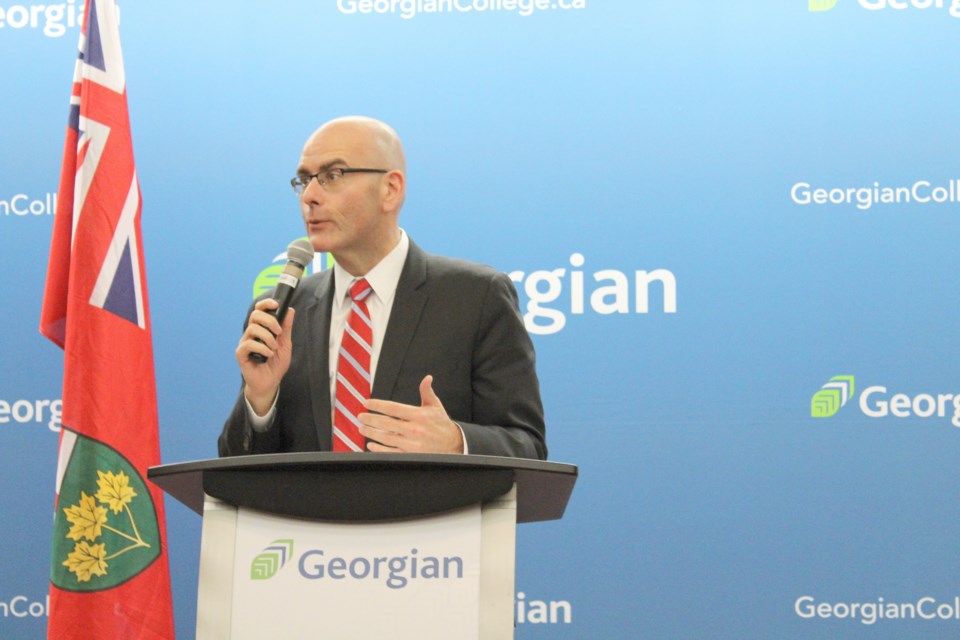What’s the point of going to college if a graduate enters the workforce only to be paid an amount similar to the minimum wage?
It’s one of many tough questions Ontario’s minister of economic development and growth fielded from students during a visit Wednesday to Georgian College in Orillia. Turns out there isn’t a simple answer.
Steven Del Duca advised the student to “stay tuned” to the provincial budget, being introduced March 28, and pointed to the Liberal government’s investment in “critical areas” to address fair and equal pay for workers.
Given his audience, Del Duca could have expected matters of education and tuition to come up during the question-and-answer session that followed his speech, and they did.
A student in Georgian’s police studies degree program asked how Ontario could level the playing field with other provinces, such as Quebec, when it comes to tuition.
“There’s no way to level it without costing the taxpayer something,” Del Duca said.
Georgian College president and CEO MaryLynn West-Moynes chimed in to clarify that while tuition for degree programs is comparatively high in Ontario, the cost to obtain a diploma is lower in the province.
Education wasn’t the only topic on the students’ minds Wednesday. Del Duca was asked about the increase in the minimum wage, with one student noting some businesses are hiking their prices in response.
“We haven’t seen any significant dislocation or significant employment loss in the province,” Del Duca responded, adding he believes it will be “a net good news story” in the years to come as people adjust to the increase.
He said it “made no sense” to the government that people were having to choose between paying rent and buying food “in a province where the economy is firing on all cylinders.”
In his opening remarks, the former transportation minister touched on the challenges of taking on the economic development portfolio in January, during a time when NAFTA has proven to be a fragile pact amid increasing protectionist policies in the United States, and now with “a certain president in a certain Oval Office” slapping tariffs on imported steel and aluminum. (Canada and Mexico have received exemptions for the time being.)
Del Duca said the government has been aggressively addressing the concerns, with the premier and some of his fellow ministers travelling to the United States to make sure Ontario is treated fairly. He and Jeff Leal, minister of agriculture, food and rural affairs, went to Mexico recently with the goal to do just that.
“We are not taking it lightly,” he told OrilliaMatters following Wednesday’s presentation, noting legislation has been passed that will allow the province to “respond proportionately” if need be.
The challenges aren’t only coming from south of the border. There is a chance Ontario, too, will elect a populist leader in Doug Ford, who recently won the Ontario Progressive Conservative Party leadership.
Ford has said he would have no problem cutting waste and finding efficiencies in government, but Del Duca said he is still waiting to hear how, specifically, that would happen without cuts being made to other important services.
“This is why it’s so important for voters to make sure they hold people to account,” he said. “I believe, in 2018, the people in Orillia need to know who will be hurt by these policies.”
Del Duca’s advice, which he also offered to the students in attendance, was to press politicians about their plans.
“People who aspire to govern need to be able to answer tough questions,” he said.



